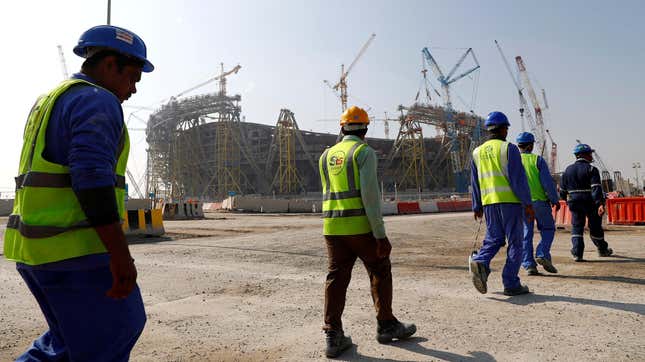
Construction workers building the 2022 FIFA World Cup stadium in Qatar have sued a US firm for human trafficking and labor exploitation.
At least 38 Filipino plaintiffs have brought Dallas-based Jacobs Solutions and its subsidiary CH2M to court for choosing to “knowingly participate in—and profit from—ventures that exploited Plaintiffs’ labor,” according to the complaint (pdf) filed in a Colorado district court yesterday (Oct. 12). They’re suing over the violation of the US Trafficking Victims Protection Reauthorization Act.
The workers allege that the firms lied to workers about the terms of their employment and available living conditions, holing them up in cramped, unhygienic barracks and having the work in the heat for up to 72 hours straight without food and water. The employers were also accused of confiscating the workers’ passports so they were “unable to leave Qatar, address their condition of inhumane and forced labor, or change employer.”
In a statement emailed to Quartz, Jacobs Solutions said it had “not yet been served with the lawsuit or had the opportunity to thoroughly review the allegations.” It added: “As a purpose-led company, we are committed to respecting the human rights and dignity of those within our operations and where we do business. In all projects across the 40+ countries in which we operate, we have prioritized health, safety and wellbeing, partnering with clients and suppliers to develop innovative approaches that improve the lives of workers and other stakeholders.”
Qatar’s bid to host the 2022 World Cup was approved more than a decade earlier, in 2010. As of 2017, when Jacobs acquired CH2M, the company managed and supervised construction for the entirety of the World Cup Construction Venture, the complaint says, including managing, auditing, and awarding the work for all stadiums and related infrastructure. The all-encompassing overseer role, combined with the Middle Eastern kafala system of sponsorship for foreign workers, gave the private sector near-total control over employment conditions and immigration status of migrants involved in the project.
The latest case adds to a trove of complaints filed by workers around the world, including a 2016 one by the Netherlands Trade Union Confederation (FNV) on behalf of Nepali workers.
Qatar’s World Cup labor exploitation, by the digits
QR750 ($210): Monthly minimum wage in Qatar prior to August 2020, when the country raised its minimum wage and applied it to foreign workers for the first time
14: The minimum number of people CH2M estimated would die while building Qatar’s World Cup stadiums. “I am half expecting bodies to land next to me every time I go past” unsafe construction sites, one manager remarked.
6,500: Migrant workers from India, Pakistan, Nepal, Bangladesh and Sri Lanka that died in Qatar in the decade after the country won hosting duties for the World Cup, a Guardian investigation revealed. Last year, the Qatar World Cup admitted workers had died in projects connected to the tournament, but floated a much lower death toll of 400 to 500,
Quotable: Woes of migrant workers in Qatar
“Migrant workers were indispensable to making the World Cup 2022 possible, but it has come at great cost for many migrant workers and their families who not only made personal sacrifices, but also faced widespread wage theft, injuries, and thousands of unexplained deaths.”
—Rothna Begum, senior researcher at Human Rights Watch, in November 2022, a month before the World Cup tournament began